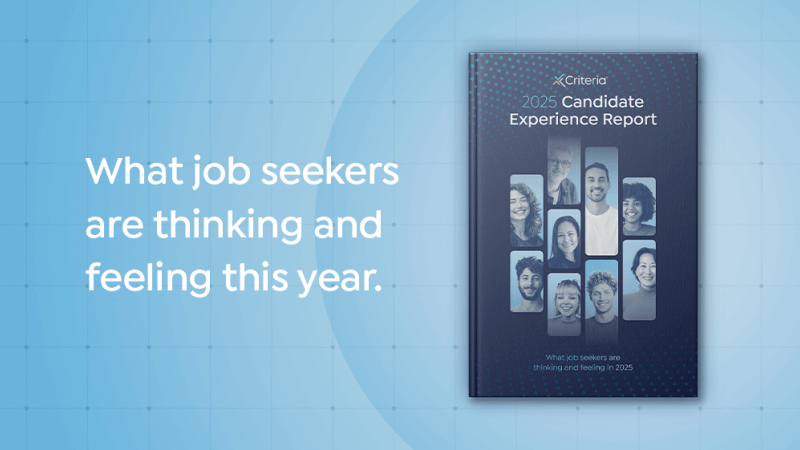Each year, we survey job seekers to better understand their thoughts, preferences, and motivators. This year we collected responses from more than 2,000 candidates from around the world, spanning a wide range of industries, experience levels, and backgrounds. Our goal with this report is to help companies understand what candidates are looking for so talent leaders can meet those needs.
In 2025, it seems the only thing we can be certain of is uncertainty. With political and economic instability dominating the news and GenAI reshaping work as we know it, job candidates are eager for solid ground. Data from the 2025 Candidate Experience Report shows that stability is the name of the game this year.
Let’s take a dive into the data – here are the 4 most interesting findings from our 2025 Candidate Experience Report:
1. Candidates are looking to stay in their next role for longer.
While the majority (42%) of candidates want to stay in their next job for 3-5 years, the number of candidates who are looking for longer tenure has increased in the last year. 19% of respondents are targeting 6-10 years (up 2% from 2024), and 28% want to stay win a job for more than 10 years (up 3% from 2024).

The turbulence of the job market in the last 5 years – beginning with mass COVID layoffs in 2020 and more recently with major companies restructuring in response to a volatile economy – may have candidates craving greater stability in their career.
To win over tenure-seeking talent, highlight your organization’s opportunity for career growth and development. Our survey revealed that opportunity for advancement is the number priority for job seekers this year. Candidates are eager to learn and build out their skillset on the job, especially if it helps them settle into their new role for the long haul.
2. 55% of job seekers are looking to switch careers this year.
More than half of all job candidates are interested in changing to a new career path in 2025, though the desire varied greatly by industry. 76% of job seekers in retail were interested in a career switch, with construction (61%) coming in close behind. These two industries are directly impacted by economic issues like tariffs and trade wars, leading to decreased job security for workers in both sectors.
A cohort of candidates looking to shift gears in their career presents a well of untapped potential for employers this year. To uncover the hidden gems in this talent pool, consider incorporating skills-based hiring strategies and assessments in your hiring process this year.
3. Two-thirds of candidates care about the financial health of a company.
High-profile layoffs over the last few years have candidates keen on understanding their potential new employer’s finances. In 2025, 67% of job seekers investigated the financial health of a company before choosing to accept a role with them.

Job seekers are aware that the most recent hires that are typically the first go if layoffs happen, meaning they could be back on the job hunt if their new role gets cut when employers tighten their belts.
During interviews, be prepared to answer questions about the financial health of your organization and what your plans are to weather potential economic storms. Transparency goes a long way when building trust with candidates (and potential new hires), and reassuring job security can help increase job offer acceptance.
4. Job seekers feel uneasy about employers that use AI in their hiring process.
In 2025, 31% of candidates feel negatively about organizations using AI during hiring, up 8% from last year. High competition in today’s job market may have candidates concerned that AI is unfairly screening them out and making it harder for them to land a job.

Hiring is an innately human process: there’s a lot on the line for both job seekers and employers. The reality is that AI tools can be incredibly useful for hiring teams, as long as they are used ethically and aren’t the driving force behind the hiring decision.
Despite the hesitation many candidates feel about employers using AI, 26% of job seekers we surveyed used AI to apply to jobs and 40% have adjusted their resume to compensate for AI resume screening tools. Candidates are using AI tools themselves to try and reshape their resume into something that ticks all the boxes for the initial resume screenings. Candidates are even harder to differentiate than before, and employers lean more heavily into AI tools to try and suss out the best applicants. The result? An AI-arms race!

Help candidates feel confident that your hiring process is treating them fairly to combat concerns over AI. The best way to boost confidence in your hiring process is to lean in to hiring strategies job seekers already feel are fair. For example, 86% of job seekers either like or feel neutral about taking assessments when applying for jobs.
Lean into objective measures of potential and you’ll likely see job seeker’s AI fears melt away.
Aligning with Candidate Needs Is the Key to Hiring Success in 2025
This year’s Candidate Experience Report makes one thing clear: job seekers are craving stability, transparency, and fairness more than ever. Whether they’re switching careers, seeking long-term roles, or wary of the job market, candidates are telling us exactly what they need to feel confident in their next move. Organizations that listen and adapt will be the ones that win top talent in 2025 and beyond.
Download the full report for more valuable insight into candidate behavior that you use can win over top talent.





